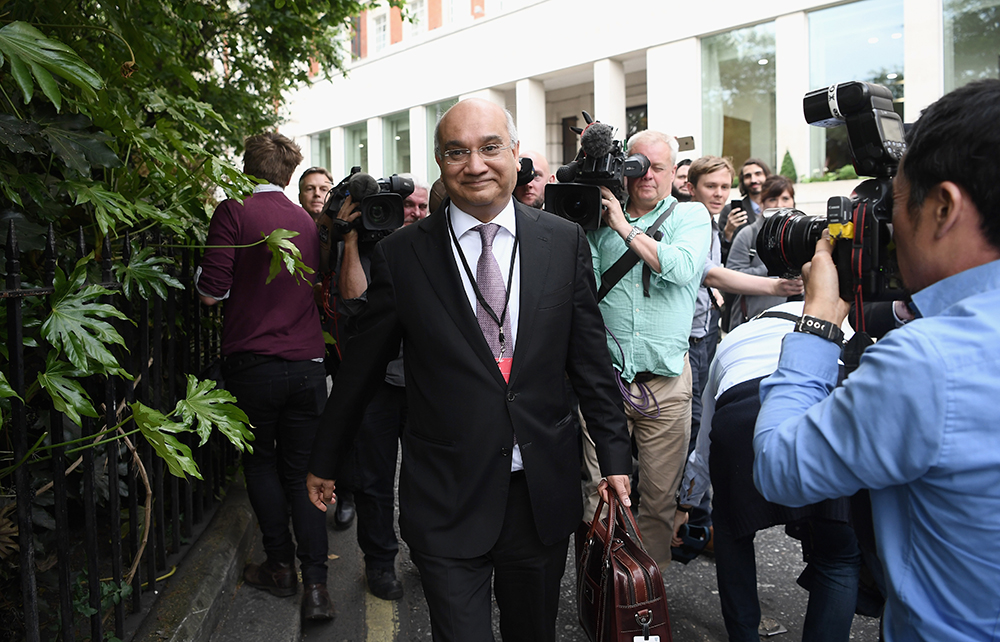Natasha Feroze has narrated this article for you to listen to.
When Keith Vaz announced his ambition to stand as an independent for Leicester East in the general election, no one in my hometown was surprised. Vaz may be a joke nationally, known for a fondness for rent boys. But in Leicester East, he remains something of a local hero. It may seem astonishing to the rest of the country, but it’s quite possible that despite everything, come July, Vaz will make a triumphant return.
An elderly woman lights up
at the mention of his name: ‘He wanted to take my picture!’
Leicester was one of the first British cities to have a majority non-white population and its British Indians are a highly prized voting bloc. They are the country’s largest immigrant group: young, fast-growing and aspirational. For decades, Vaz represented this group’s connection to the Labour party, and when he stood down from the Commons in 2019, there was a drift of Hindus and Muslims away from their left-leaning political roots.
Jeremy Corbyn didn’t help. His vocal support for Kashmir’s independence saw many Hindus fall out of love with Labour, and now the Gaza effect also threatens to chip away at the party’s Muslim support. It’s these issues that the seven candidates in Leicester East are being forced to address when knocking on doors.
Vaz is standing for the One Leicester party and he’ll be going head to head with his successor, the current MP Claudia Webbe. Webbe, like Vaz, is an independent who has a past scandal to contend with. In 2020, she was expelled from the Labour party after she was given a suspended sentence for harassing her ex–boyfriend’s partner. She is vying with Vaz for the Muslim vote and is reportedly in talks with George Galloway’s pro–Palestine party.
Meanwhile Labour has made the mistake, once again, of picking a non-local candidate, Rajesh Agrawal, a former deputy mayor of London. Labour’s failings mean that for the first time in decades, the Conservatives have started being taken seriously as contenders. A council by-election within the constituency in 2022 resulted in a huge swing to the Tories, who won, with Labour relegated to third place. The local Conservative party also welcomed defectors when Labour’s national committee dramatically purged 19 of its councillors before the 2023 local elections. Rishi Sunak, as the first Hindu prime minister, was very appealing to Leicester East. But Vaz could topple everything.
It helps that he knows every corner of the city – and visits them regularly. ‘He was here just two days ago,’ says an elderly woman I speak to in a high-street flower shop. She lights up at the mention of his name: ‘He wanted to take my picture!’ Vaz’s scandals are also lower down the list of people’s priorities these days – especially after the violent conflicts between Hindus and Muslims in 2022. ‘As long as their family’s immigration papers are sorted, they don’t care,’ one constituent tells me.
Vaz’s biggest endorsement came a few years ago, when he was voted honorary chair of the Leicester East Labour party – a contentious decision made by local members, as he had been blacklisted by Labour HQ. But while Vaz may have faced national disgrace, the local party understood how he was perceived in the area – and how resilient he is. The man is, after all, known as Mr Vazeline: problems that would have destroyed other people seemed to slide off him.
First elected to the Commons in 1987, by 2012 he had already faced two parliamentary investigations, been forced out as Europe minister, been suspended from parliament for a month and faced accusations over his expenses. Yet on he went.
In 2016 a Sunday Mirror sting operation uncovered him offering to buy cocaine for male prostitutes. He resigned as chair of the Home Affairs Select Committee stating, ‘those who hold others to account must themselves be held to account’. Yet within a month, as the investigation into the scandal was under way, he applied to join the Justice Select Committee, and was successful. Following the end of the investigation in 2019, he was suspended from the Commons for six months – but not long into the suspension period resigned from parliament. He came under further scrutiny in 2021 when a report revealed that as an MP he had engaged in ‘sustained and unpleasant bullying’ towards parliamentary staff. Vaz declined to co-operate with this report, claiming to be too ill. Only John Bercow, with his own history of bullying allegations, defended him.
Vaz’s CV, then, is far from ideal. Yet the voters in Leicester seem able to overlook his faults. ‘Better the devil you know than the devil you don’t,’ one resident tells me. Vaz’s 32 years as a Labour MP still work in his favour: he has an army of volunteers, built up over the decades, who remain loyal supporters. Compared to the other six candidates, he is easily the most experienced canvasser.
The relationship between Vaz and the South Asian community can be hard for outsiders to understand. South Asians are known for their socially conservative values, so you’d have thought they’d be put off by a sex scandal. Yet Vaz has put in the work. He offered himself up as a local commentator when out of office, running his own radio show, with Bollywood stars like Shilpa Shetty dialling in. He was rumoured to have continued weekly surgeries, despite no longer being an MP.

When the Leicester riots kicked off in 2022, he posted a video describing the city as ‘one big happy family’ – defending its reputation. Leicester is often namechecked by politicians such as Suella Braverman who want to prove that ‘multiculturalism’ has failed in Britain. But here, those riots were not viewed through the lens of a Hindu–Muslim divide. Rather, many people think the violence broke out because of a tension between older and newer immigrants.
The rioters were made up, largely, of a new migrant community from Daman and Diu, next to Gujarat, which were colonised by Portugal. These migrants have settled in Britain under Portuguese citizenship. There are now nearly 20,000 Portuguese passport holders in Leicester, making up 5 per cent of the population. Their conditions are poor: they work in textile warehouses and often have many families living under one roof.
It’s a growing issue for local residents, one that Leicester’s next MP will be forced to address – not least because whoever is elected can’t win by appealing to one voter bloc alone. But if Leicester’s ‘melting pot’ demographics work in anyone’s favour, it’s Vaz’s. As a Christian, whose family is from Goa, he can lean in – and out – of identity politics in a way that makes him seem relatable to a variety of groups. If he does, he may well become MP for Leicester East once again.








Comments